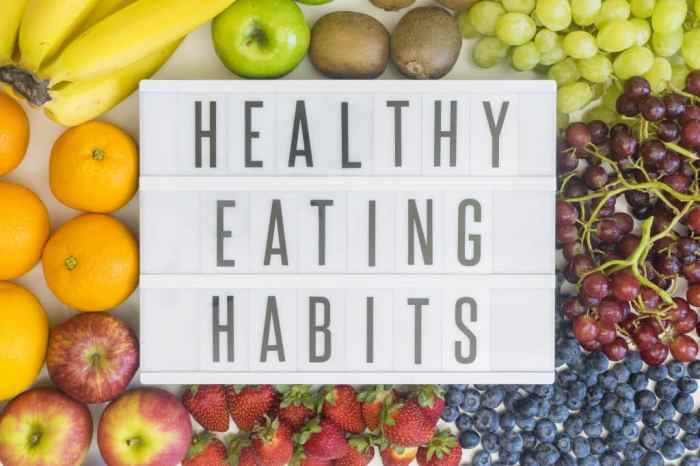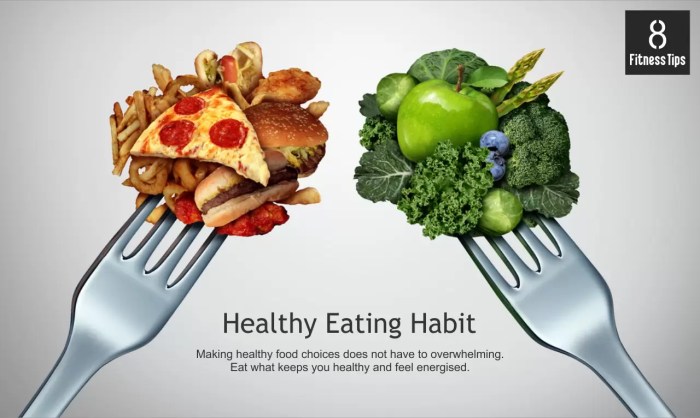Healthy Eating Habits, the key to a vibrant life! Let’s dive into the world of nutritious choices, balanced diets, and overall well-being with a cool high school vibe.
From the impact on physical health to tips for establishing healthy habits, get ready to rock your kitchen and nourish your body like a boss.
Benefits of Healthy Eating Habits
Healthy eating habits have numerous benefits that positively impact both physical and mental well-being. By maintaining a balanced diet, individuals can experience a range of advantages that contribute to overall health.
Impact on Physical Health
Eating nutritious foods rich in essential vitamins and minerals helps in boosting the immune system, improving energy levels, and supporting healthy weight management. It also reduces the risk of chronic diseases such as heart disease, diabetes, and certain types of cancer.
Contribution to Mental Well-being, Healthy Eating Habits
A balanced diet not only nourishes the body but also plays a significant role in mental health. Consuming foods that are high in omega-3 fatty acids, antioxidants, and other nutrients can enhance cognitive function, mood, and overall brain health.
Benefits of Maintaining a Balanced Diet
By incorporating a variety of fruits, vegetables, whole grains, lean proteins, and healthy fats into daily meals, individuals can ensure they are getting the necessary nutrients for optimal health. This can lead to increased longevity, improved quality of life, and a reduced risk of developing various health conditions.
Components of a Healthy Diet

Eating a balanced diet is crucial for maintaining overall health and well-being. This involves consuming a variety of foods that provide essential nutrients for the body to function optimally.
Key Food Groups for a Balanced Diet
When it comes to maintaining a healthy diet, it is important to include the following key food groups:
- Fruits: Rich in vitamins, minerals, and antioxidants, fruits are essential for overall health and can help reduce the risk of chronic diseases.
- Vegetables: Packed with fiber, vitamins, and minerals, vegetables are crucial for proper digestion and immune function.
- Whole Grains: Provide energy through complex carbohydrates and are a good source of fiber, promoting heart health and aiding in digestion.
- Proteins: Necessary for building and repairing tissues, proteins can be found in sources like lean meats, poultry, fish, beans, and nuts.
- Dairy or Dairy Alternatives: Rich in calcium and vitamin D, dairy products help maintain bone health and support overall growth and development.
Importance of Incorporating Fruits and Vegetables
Fruits and vegetables are essential components of a healthy diet due to their high nutrient content and numerous health benefits:
- Provide essential vitamins and minerals that support various bodily functions.
- Rich in antioxidants that help protect cells from damage and reduce the risk of chronic diseases.
- High fiber content aids in digestion, promotes satiety, and supports a healthy weight.
- Low in calories but high in nutrients, making them ideal for overall health and well-being.
Role of Protein, Carbohydrates, and Fats
Protein, carbohydrates, and fats are macronutrients that play vital roles in a healthy diet:
- Protein: Essential for building and repairing tissues, supporting immune function, and serving as a source of energy when needed.
- Carbohydrates: Provide the body with its primary source of energy, especially important for brain function and physical activity.
- Fats: Necessary for absorbing fat-soluble vitamins, providing energy, and supporting cell growth. Healthy fats like omega-3 fatty acids are beneficial for heart health.
Tips for Establishing Healthy Eating Habits

Eating healthy doesn’t have to be complicated. By following some simple tips and strategies, you can make significant improvements to your diet and overall health.
Meal Planning for Healthy Eating
Meal planning is a key component of maintaining healthy eating habits. By taking the time to plan your meals ahead of time, you can ensure that you have nutritious options available and avoid the temptation of unhealthy choices. Consider preparing meals in bulk and portioning them out for the week to save time and ensure you have healthy options readily available.
Choosing Whole, Nutrient-Dense Foods
Opting for whole, nutrient-dense foods over processed options is essential for establishing healthy eating habits. Whole foods like fruits, vegetables, whole grains, lean proteins, and healthy fats provide essential nutrients and are free from added sugars, unhealthy fats, and artificial ingredients. Be sure to read labels and choose foods with minimal processing and added ingredients.
Importance of Portion Control and Mindful Eating
Practicing portion control and mindful eating can help you maintain a healthy weight and prevent overeating. Pay attention to serving sizes, use smaller plates, and listen to your body’s hunger cues to avoid consuming more food than your body needs. Eating slowly, savoring each bite, and avoiding distractions like screens can help you tune in to your body’s signals of fullness and satisfaction.
Impact of Healthy Eating on Specific Health Conditions: Healthy Eating Habits
Healthy eating habits play a crucial role in managing various health conditions. Let’s dive into how dietary choices can impact specific conditions like diabetes, heart health, and energy levels and productivity.
Managing Diabetes
Healthy eating is essential for managing diabetes as it helps control blood sugar levels. A diet rich in fiber, whole grains, lean proteins, and healthy fats can help regulate glucose levels and reduce the risk of complications. Avoiding sugary drinks and processed foods is also key in managing diabetes effectively.
Heart Health
Diet plays a significant role in heart health. Consuming a diet low in saturated fats, trans fats, and cholesterol can help lower the risk of heart disease. Foods rich in omega-3 fatty acids, such as fatty fish, nuts, and seeds, can also promote heart health. Additionally, incorporating plenty of fruits, vegetables, and whole grains into your diet can help maintain a healthy heart.
Energy Levels and Productivity
The foods we eat directly impact our energy levels and productivity. Consuming a balanced diet that includes a mix of carbohydrates, proteins, and healthy fats can provide sustained energy throughout the day. Eating regular meals and snacks, staying hydrated, and avoiding sugary snacks can help maintain stable energy levels and improve productivity.
